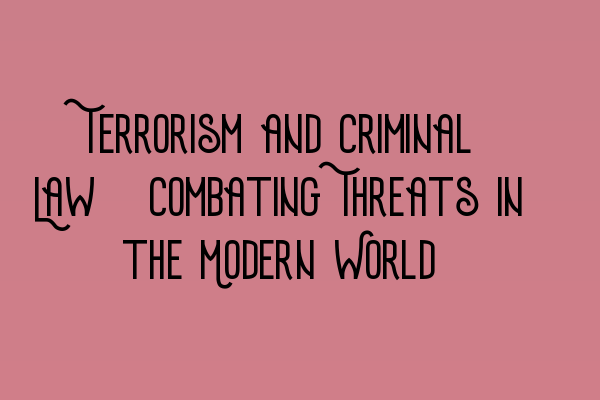Terrorism and Criminal Law: Combating Threats in the Modern World
In today’s world, terrorism has become a major global concern. Governments and legal systems around the world are engaged in the continuous battle against terrorism to ensure the safety and security of their citizens. This blog post will explore the intersection of terrorism and criminal law, highlighting the measures taken to combat this threat in the modern world.
Terrorism Defined
Before delving into the legal aspects, let us first define terrorism. Terrorism can be defined as the use of violence, intimidation, or threat to achieve political or ideological objectives. Acts of terrorism can cause immense harm, not only to individuals but also to societies as a whole.
Considering the gravity of this threat, it is imperative to have robust legal measures in place to prevent and prosecute those involved in terrorist activities.
The Role of Criminal Law
Criminal law plays a crucial role in combating terrorism. It provides a framework that defines and prosecutes terrorist acts. The statutes and regulations surrounding terrorism are constantly evolving to keep up with the changing face of this global threat.
The criminal law system is designed to ensure that individuals involved in terrorist activities are brought to justice. The penalties for such offenses are severe, as they deserve to be. Society cannot afford to be lenient when it comes to combating terrorism.
One of the challenges faced by law enforcement agencies is the detection and prevention of terrorist plots. Intelligence gathering and sharing play a pivotal role in this regard. Governments and security agencies have established dedicated departments and units to collect, analyze, and disseminate intelligence to combat terrorism effectively.
International Cooperation
Terrorism is a transnational threat, which requires international cooperation. Governments around the world are actively involved in sharing information, coordinating efforts, and extraditing individuals involved in terrorist activities.
International treaties, conventions, and agreements have been established to facilitate cooperation and ensure that terrorists do not find safe havens in different countries.
Challenges and Future Directions
While significant progress has been made in combating terrorism, challenges persist. The rapid advancement of technology has opened new avenues for terrorists to communicate, plan, and execute their activities. Cyberterrorism, for example, poses a significant threat that requires innovative and adaptive legal measures.
Furthermore, the ever-evolving nature of terrorism demands continuous updates to criminal laws and procedures. Lawmakers and legal experts must stay vigilant and adapt quickly to emerging trends and tactics employed by terrorist organizations.
If you are interested in learning more about criminal law and terrorism, we recommend checking out our related articles:
- SQE 1 Practice Exam Questions
- SQE 1 Practice Mocks FLK1 FLK2
- SQE 2 Preparation Courses
- SQE 1 Preparation Courses
- SRA SQE Exam Dates
Stay informed, stay safe!
